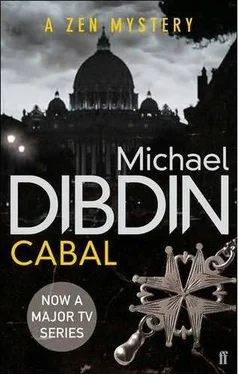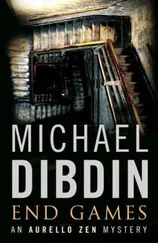Michael Dibdin - Cabal
Здесь есть возможность читать онлайн «Michael Dibdin - Cabal» весь текст электронной книги совершенно бесплатно (целиком полную версию без сокращений). В некоторых случаях можно слушать аудио, скачать через торрент в формате fb2 и присутствует краткое содержание. Жанр: Полицейский детектив, на английском языке. Описание произведения, (предисловие) а так же отзывы посетителей доступны на портале библиотеки ЛибКат.
- Название:Cabal
- Автор:
- Жанр:
- Год:неизвестен
- ISBN:нет данных
- Рейтинг книги:5 / 5. Голосов: 1
-
Избранное:Добавить в избранное
- Отзывы:
-
Ваша оценка:
- 100
- 1
- 2
- 3
- 4
- 5
Cabal: краткое содержание, описание и аннотация
Предлагаем к чтению аннотацию, описание, краткое содержание или предисловие (зависит от того, что написал сам автор книги «Cabal»). Если вы не нашли необходимую информацию о книге — напишите в комментариях, мы постараемся отыскать её.
Cabal — читать онлайн бесплатно полную книгу (весь текст) целиком
Ниже представлен текст книги, разбитый по страницам. Система сохранения места последней прочитанной страницы, позволяет с удобством читать онлайн бесплатно книгу «Cabal», без необходимости каждый раз заново искать на чём Вы остановились. Поставьте закладку, и сможете в любой момент перейти на страницу, на которой закончили чтение.
Интервал:
Закладка:
He retrieved his radio and pressed the call-up button. While Control took their sweet time about answering, as usual, Grimaldi looked round to try and find the man in the suede jacket and the woman in the tweed coat, but they were no longer there.
‘Well?’ a crackly voice demanded crossly in his ear.
‘This is Grimaldi. We have a jumper in the basilica.’
‘In progress or complete?’
‘Complete.’
He switched off the radio. There was no need to say more. Suicides were a regular occurrence in St Peter’s, partly due to the vertiginous attraction of high places in general, but still more to a popular belief that those who died on the Apostle’s tomb went straight to heaven, by-passing the normal red tape and entry quotas. The Church had preached repeatedly and at length against this primitive superstition, but in vain. The part of the inner gallery beneath the dome that was open to the public had been fitted with a two-metre-high wire-mesh security fence, but if folk want to kill themselves badly enough it’s impossible to prevent them doing so.
Nevertheless, this particular jump was unique, at least in Grimaldi’s experience. As far as he knew, no one had ever managed to commit suicide while Mass was being said, for at such times there was no access to the dome.
Grimaldi’s message set in motion a well-established routine. The first step was to clear the basilica. Those witnesses suffering from shock were led across the piazza to the Vatican’s first-aid post, pausing briefly to allow the passage of an ambulance from the nearby Santo Spirito hospital. When there was life to be saved, as when Papa Wojtyla had been shot, the Church preferred the high standards of its own Policlinico Gemelli, but when it came to carting away corpses the institutions of the Italian state were good enough.
The ambulance slowed at the gate beneath the Arch of the Bells where the Swiss Guards, who had been advised of the situation, waved it through into the succession of small, dark courtyards flanking the east side of St Peter’s. Just beyond the enormous bulge of the transept a uniformed member of the Vigilanza, the Vatican Security Force, waved the vehicle to a halt. The ambulance men got out, opened the rear doors and lifted out a stretcher. Then they followed the security guard through a door into a bare sloping passage tunnelled into the massive lower walls of the basilica. They passed through two small antechambers, then through a doorway concealed beneath the beckoning skeletons of Bernini’s funeral monument to Alexander VII, and thence into the basilica itself.
In the open space between the apse and the papal altar, a team of cleaners in blue overalls waited with their mops and buckets, ready to expunge every physical trace of the outrage once the body had been removed. A bishop would then be summoned to perform the spiritual equivalent, a rite of reconsecration. The ambulance men put down their stretcher and set about unwrapping the green plastic sheeting used to wrap the remains. At this point Giovanni Grimaldi turned aside, his stomach thrashing like live fish in a net. It was precisely to avoid having to witness things like this that he had come to work for the Vatican in the first place.
The son of a fisherman from Otranto, Grimaldi had started his career in the Carabinieri, and as a brighter-than-average recruit was rapidly promoted to investigative work. He had stuck it for four years, struggling heroically with a squeamishness which he knew would master him in the end. Every time he had to go to the scene of a violent crime his guts tightened up, his breath choked like an asthmatic’s, his skin became filmy with perspiration and his heart went wild. For days afterwards he couldn’t sleep properly, and when he did, the dreams were so horrible that he wished he hadn’t.
His colleagues seemed to think nothing of spending the morning poking around a burnt-out car containing the remains of four local mobsters and then tucking into a nice charred roast at lunch, but Grimaldi lacked this ability to detach his professional and private lives. The experience had marked him even physically. His body was hunched, his head lowered, face averted, and his eyes peered up with the guarded, wary look of abused children. His hair had started falling out at an alarming rate, while deep wrinkles corrugated his face until by now he looked older than his own father — who still put to sea each night with his crew of illegal Algerian immigrants, and didn’t give a fuck about anything.
The usual fate of ex-Carabinieri is to join one of the many armies of private bank guards, but thanks to a local politician who had a word with a bishop who mentioned the matter to a monsignore in the Curia who had the ear of a certain archbishop in the Palazzo del Governatorato, Giovanni Grimaldi moved to Rome and became a member of the Vigilanza. Because of his experience and abilities, he was soon transferred to a select detective unit responsible directly to the Cardinal Secretary of State. In addition to investigating such minor crime as occurred within the Vatican — mostly petty theft — this group allegedly carried out a variety of covert operations which were the subject of considerable gossip among employees of the Curia. His children only visited him in the holidays now, and his wife in his dreams, for she had contracted cancer the year after he settled in the capital. The children now lived in Bari with Grimaldi’s sister, while he himself eked out a solitary life in a church property near the Vatican, trying to make ends meet for his absentee family, and to put a little aside for the future.
Despite himself, Grimaldi glanced over as the ambulance men transferred the corpse to the plastic sheeting. He noted with impersonal curiosity, as though watching a film, that the blue lounge suit in which the shattered body was clad was of the highest quality, and that one of the black brogues was missing. He looked again at the material of the suit. It looked oddly familiar. His breath started to come in heaves and gasps. No, he thought, not that. Please not that.
The ambulance men had already started to parcel up the body.
‘Just a minute,’ Grimaldi told them. ‘We need to know who he was.’
‘That’s all done at the hospital,’ one of the men replied dismissively, not even looking up.
‘The victim must be identified before the body is released to the representatives of the Italian authorities,’ Grimaldi recited pedantically.
The ambulance man looked up wearily, as though dealing with a halfwit.
‘All the paperwork’s done back at the morgue. We’ve got a strict turn-around time.’
Grimaldi planted his foot on the plastic sheeting just inches from the man’s hand.
‘Listen, this may be just another bit of Trastevere to you, but when you drove through the archway out there, past our Swiss friends in their fancy dress, you left Italy and went abroad. Just like any other foreign country, this one has its own rules and regulations, and in the present case they stipulate that before this cadaver can be released to the representatives of the Italian state — that’s you — it must be identified to the satisfaction of an official of the Vatican City State — which in this case means me. So let’s get busy. Pass me the contents of his pockets.’
The ambulance man heaved a profound sigh, indicating helpless acquiescence in the face of might rather than right, and started to go through the dead man’s clothing. The trouser pockets and the outer ones of the jacket were empty, but a zipped pocket inside the left breast of the jacket yielded a large metal key, seemingly new, and a worn leather wallet containing an identity card and driving licence. The security man scanned these documents, then brusquely turned his back on everyone and switched on his radio again.
Читать дальшеИнтервал:
Закладка:
Похожие книги на «Cabal»
Представляем Вашему вниманию похожие книги на «Cabal» списком для выбора. Мы отобрали схожую по названию и смыслу литературу в надежде предоставить читателям больше вариантов отыскать новые, интересные, ещё непрочитанные произведения.
Обсуждение, отзывы о книге «Cabal» и просто собственные мнения читателей. Оставьте ваши комментарии, напишите, что Вы думаете о произведении, его смысле или главных героях. Укажите что конкретно понравилось, а что нет, и почему Вы так считаете.












